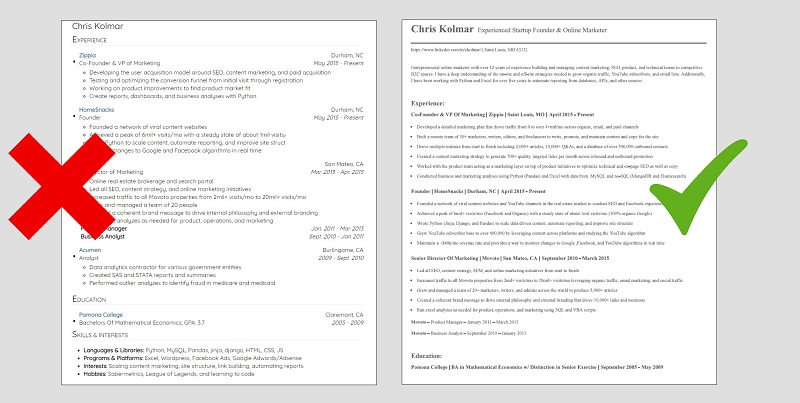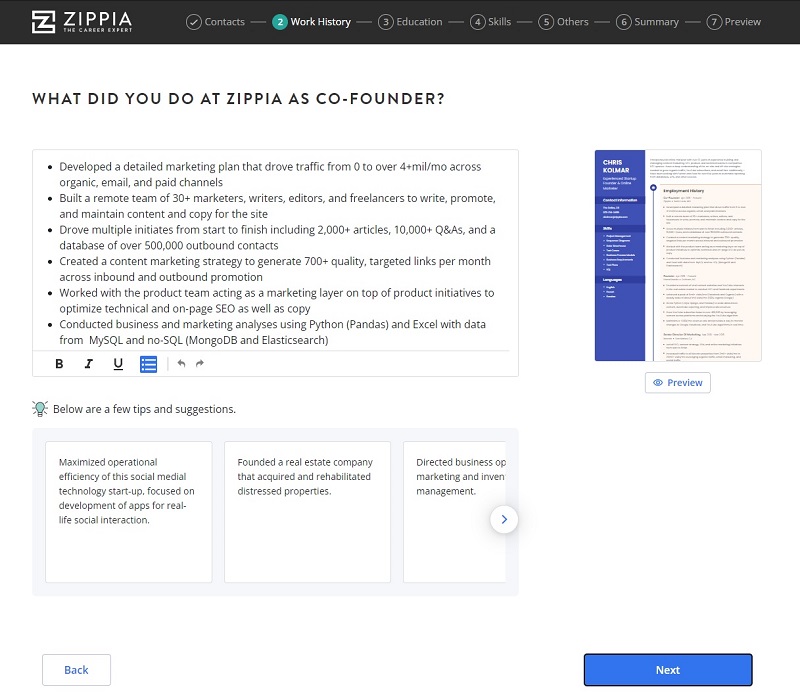- Parts Of A Resume
- How To Write A Resume
- Resume Skills Section
- Resume Objective Section
- Career Objective Section
- Resume Reference Section
- Resume Summary Section
- Resume Summary Example
- Resume Interests Section
- Address On Resume
- Relevant Work Experience
- Anticipated Graduation Date On Resume
- Education Section On Resume
- Contact Information On Resume
- Statement Of Qualifications
- How To List Publications On Resume
- Accomplishments On Resumes
- Awards On Resume
- Dean's List On Resume
- Study Abroad On Resume
- Resume Format
- Resume Templates
- General Resume Examples
- Resume Builder
- Resume Format
- Resume Margins
- Resume Header
- Work Experience On Resume
- Irrelevant Work Experience
- Listing Languages On Resume
- Volunteer Work On Resume
- GPA On Resume
- Resume Title
- Summary Of Qualifications
- Resume Picture
- Python Project On Resume
- Google Docs Resume Template
- Professional Bio On Resume
- Multiple Positions At Same Company
- Relevant Coursework Resume
- Where And How To Put Internships On Your Resume
- Professional Resume Formats
- Resume Types
A bio is a short piece of writing that advertises who you are as a professional to potential employers and clients. It demonstrates your strengths, motivations, and why you’re an expert in your field. Most people are familiar with the concept of creating a bio for their social media page, but developing your professional bio includes a more detailed explanation of your career.
Fitting all the details of your professional life into a few measly paragraphs is a difficult feat, but doing it well can lead to improvements in your customer base, increase calls for interviews, and more.
Key Takeaways:
-
A professional bio helps personalize your story to attract potential employers, clients, and the general public.
-
A professional bio should highlight your profession or brand, as well as describe your accomplishments, responsibilities, passions, and interests.
-
Professional bios should be concise, personable yet professional, and updated regularly.
-
Professional bios are great for social media profiles, professional websites, and portfolios.
-
Make sure your professional bio is appropriate for your goals.

Want to save time and have your resume ready in 5 minutes? Try our resume builder. It’s fast and easy to use. Plus, you’ll get ready-made content to add with one click. See 10+ resume templates and create your resume here.

One of users, Diana, had this to say:
I was guided on how to make a detailed and professional resume on Zippia. I was able to download it with unlimited access to all features.
What Is a Professional Bio?
Similar to how a 140 character resume is a brief description of your work experience, skills, and education, your professional bio will articulate the same information. They both serve as introductions to a specific audience. However, a professional bio is formatted differently.
Instead of writing out bullet points of your accomplishments and skills, a professional bio has a few paragraphs of full sentences outlining these qualities. Additionally, a bio on your website or an employee page will explain further what makes you passionate about your job.
It’s meant to attract the attention of more than just possible employers to whom you send your resume in the hopes of landing a job. It’s about intriguing the public. Potential clients and followers on social media are more responsive to hearing a person’s story in the form of a professional bio than reading off lists of skills on a resume.
How to Write a Professional Bio
The first draft of a professional bio is tough for most. Cramming in all the information about yourself that you want to share with your audience is a difficult task.
To help you through the process a little more, read through the following steps to write an effective professional bio.
-
Introduce Yourself In The Third Person. The first thing you want to do when writing a professional bio is to introduce yourself with your full name. The reader has to know who they’re learning more about from the start.
Most professional bios are written in the third person to give the writing more of an advertisement feel. Stating “My name is…” or “I am…” and then continuing your bio in the first person can come off as too informal for your website or professional social media page.
-
State Your Position Or Brand. Now that your reader understands who they’re learning about, you can get into the details of your professional title or brand. Consider who you’re catering your bio to and what actions you want them to take after reading it.
-
If your goal is to bring in new clients to improve your business’s sales, focus on establishing a brand for your name and role.
-
If you want to get an interview with a potential employer, emphasize your job title and the company you work for currently or in the past.
-
-
Explain Your Professional Responsibilities. A reader of your professional bio might not know what exactly someone with your job title does. Giving a brief overview of your job or business provides a more well-rounded description of what your work entails. Try to keep this part of your professional bio under a sentence long.
-
Why Are You Passionate About Your Job? One of the biggest conditions that set a bio’s contents apart from a resume is including the motivations for why you do your job.
This is an integral part of your professional bio because it explains to the potential employer or customer your motivations for choosing this career. Audiences are most invested in businesses and job candidates who display a passion for their field and explain why they love their work.
-
Describe Accomplishments In Your Career. This is the spot in your website bio when a little bragging about your accomplishments, in a professional way, can actually help you connect with your audience.
While you shouldn’t sound conceited, consider your career achievements thus far that you’re the proudest of. Your potential employer or customer wants to know why you’re better than the competition, and describing your impressive professional accomplishments can demonstrate this.
-
Close With Your Hobbies Or Personal Interests. It’s common for a strong professional bio to give a closing blurb about what the person enjoys doing when they’re not working.
This makes the professional biography more relatable to the reader. It gives a picture of who they are aside from their business accomplishments and establishes a deeper connection. Only include hobbies and details that are work-appropriate and make you a more compelling choice to work with.
Update Your Resume Now To Get Your Next Job Faster

Tips for Writing a Professional Bio
-
Be Concise. A professional bio’s objective is to pique your audience’s interest enough to draw them into contacting you. A mistake a lot of people make in their bio is making it too long. Both consumers and employers have short attention spans. A professional bio that drones on forever will result in them losing interest.
Only summarize the most important and relevant details to the reader making a decision about you or your business.
-
Don’t Be Too Uptight. Even though a bio on your website or networking profile is supposed to sound professional, that doesn’t mean it needs to be boring. The purpose of a website or LinkedIn bio is to interest the reader. Give your professional bio some personality, and show who you are beyond your career history.
-
Update Your Bio Regularly. The purpose of a bio is to tell your audience where you are in your career at that moment. When things change in your professional life, such as getting a promotion or accomplishing a project goal, update your bio. It’s important to keep your professional bio relevant and current.
-
Consider A Headshot. While including a professional headshot to accompany your bio may not always be necessary, it can be a nice touch. Visual representations are often more impactful than written ones. Putting a face to the details of your professional story can help build a connection with the reader.
If you decide to incorporate a headshot into your website or employee profile bio, be sure that it’s appropriate and enhances your professional appearance.
-
Put Yourself In The Shoes Of Your Audience. One way to write a professional bio that resonates with the reader and makes them reach out to learn more is by considering your audience’s point of view. Think about what you would think as a consumer or employer if you read your bio objectively. This can help you make edits and give more clarification when needed.
Frequently Asked Questions
-
How do I write a professional bio?
-
Do I need a professional bio?
-
Is a professional bio the same as a resume?
To write a professional bio, start by knowing your audience. Some professional bios are used to promote a brand to clients, while others are used to list qualifications to attract potential employers. It is important for you to distinguish your needs.
It is also important to know where your bio will be presented. Shorter bios are more appropriate for social media and company pages, while a longer bio can be written on a personal website. In all cases, it is important that the language of your bio is direct and approachable. You want to highlight your responsibilities, qualifications, and accomplishments without losing the reader’s attention.
It depends on your profession, but it can’t hurt to have a professional bio. Professional bios are extremely helpful for those who want to build strong connections with clients or employers. This is usually the case for freelance workers such as photographers and consultants.
No, a professional bio is not the same as a resume. A professional bio acts as a more personable way to tell your story. The bio still retains elements of resume, particularly in its language and list of accomplishments. However, the bio, unlike the resume, should give a clear, concise picture of who you are and what you can do in a captivating manner.
Template for a Professional Bio
(Full Name) is a (Job Title) who works at (Company Name). For the past (Years Working There), (Pronoun) has worked on (Description of Work Responsibilities).
(Name) is passionate about (Career Field) because (Why Are You Passionate About Your Job?).
(Name) has been recognized in their field for (Professional Accomplishments) and graduated from (University if applicable).
In their spare time, (Name) enjoys (Hobbies). (Pronoun) currently lives in (Where You Live).
Then again, there’s one more thing you can do.
Make a new resume and get more interviews.
Plus, a great resume will give you an advantage over other candidates. You can write it in our resume builder here. Here’s what it may look like:
Example Professional Bios for Inspiration
Example #1: Professional Bio For A Contract Freelancer’s Website
Wendy Martin is a professional freelance photographer whose primary goal is to capture the best days of your life. Her specialty is shooting portraits and event work, with the majority of her clients being wedding parties.
Wendy loves shooting people’s special moments on camera because she enjoys helping people cherish their memories for years to come. She’s a long time believer of the phrase “a picture is worth a thousand words.”
In the ten years that she has been working as a freelance photographer, Wendy has had her work featured in Bridal Magazine three times. She has proudly worked with over 500 clients.
When she’s not shooting, organizing, and editing photos, Wendy enjoys participating in winter sports, like snowboarding. She currently lives in Aspen, Colorado with her husband and two kids.
Example #2: Professional Bio For Company Team Page
Erick Lane has been working for Thrive Media Company as a marketing specialist for the past seven years. Most of his duties involve developing project strategy and outcome analysis. Recently, Erick has taken on more management tasks and is currently leading two campaign creation teams.
When Erick was still in college at New York University, he was interested in two things: business and psychology. When he learned about the field of marketing, he knew this is where his professional future would take him.
Erick has worked on successful marketing campaigns that have brought clients a profit margin improvement of more than 10%. He’s been recognized within Thrive Media Company by being given the “Most Effective Marketer of 2017” award.
In his spare time, Erick enjoys reading historical adventure novels and cooking. He lives in Brooklyn, New York with his Dachshund named Patsy.
Example #3: Professional Bio For Owner Of A Small Business
Jason Smith is the founder and CEO of Pilot Portable Chargers, a company specializing in bringing your technology to life wherever you go.
After graduating from Cincinnati University in 2015, Jason wanted to start a business that helped the people around him.
He began Pilot when he saw a need for people to keep their phones, computers, and tablets constantly charged. He understands that whether you work remotely, travel frequently, or simply can’t afford to go offline, we all need our technology to function wherever we are.
The Pilot Portable Chargers brand went live in 2017, and in the past three years has sold upwards of 1.2 million portable chargers. A business that began with sketching ideas in a bedroom has blossomed into employing more than 150 employees. Pilot was also acknowledged as “Startup of The Year 2018” in Tech News Weekly.
Jason currently lives in Detroit, Michigan, and uses his free time to improve his golf game, work on home renovation projects, and spend time with his family of five.
- Parts Of A Resume
- How To Write A Resume
- Resume Skills Section
- Resume Objective Section
- Career Objective Section
- Resume Reference Section
- Resume Summary Section
- Resume Summary Example
- Resume Interests Section
- Address On Resume
- Relevant Work Experience
- Anticipated Graduation Date On Resume
- Education Section On Resume
- Contact Information On Resume
- Statement Of Qualifications
- How To List Publications On Resume
- Accomplishments On Resumes
- Awards On Resume
- Dean's List On Resume
- Study Abroad On Resume
- Resume Format
- Resume Templates
- General Resume Examples
- Resume Builder
- Resume Format
- Resume Margins
- Resume Header
- Work Experience On Resume
- Irrelevant Work Experience
- Listing Languages On Resume
- Volunteer Work On Resume
- GPA On Resume
- Resume Title
- Summary Of Qualifications
- Resume Picture
- Python Project On Resume
- Google Docs Resume Template
- Professional Bio On Resume
- Multiple Positions At Same Company
- Relevant Coursework Resume
- Where And How To Put Internships On Your Resume
- Professional Resume Formats
- Resume Types





